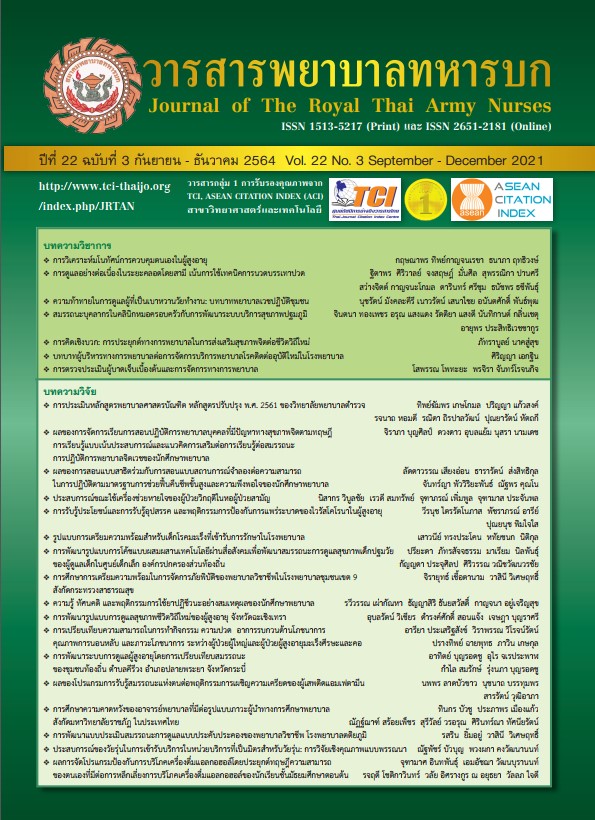The Effect of Health Literacy Program for Uncontrolled Type 2 Diabetes Mellitus Patients
Keywords:
Health literacy, Health behavior, A1c, Type 2 Diabetes MellitusAbstract
This quasi-experimental research was to study the effect of health literacy program on health literacy, health behaviors and hemoglobin A1c among uncontrolled type 2 diabetes mellitus patients. The purposive sampling was used, which the samples were diabetes patients. They were then paired into a experimental group and a control group of 31 people each. The research instruments were the health literacy program, which had content validity at 1.00. The health literacy assessment and health behaviors instrument had reliability at 0.84 and 0.80, respectively. Whereas, hemoglobin A1c had been tested. Data were analyzed by using frequency, percentage, mean, standard deviation, pair t-test and independent t-test.
The results showed that the majority of the sample were female, which was 62.90 percent. Average age was 48.59 years, secondary education was 41.93 percent. Approximately 82.30 percent had received the knowledge of diabetes. After the experiment, the experimental group had mean score of health literacy and health behaviors at 53.65 and 41.42 respectively which had higher than before the experiment at 38.77 and 30.00 respectively. The experimental group had mean score of health literacy and health behaviors at 53.65 and 41.42 respectively which had higher than the control group at 38.51 and 32.16 respectively. The experimental group had lower hemoglobin A1c (8.21) than the control group (9.69), which was a statistically significant at the .01 level. Suggestion, this health literacy program could reduce blood sugar level of type 2 diabetes mellitus patients.
Downloads
References
International Diabetes Federation.IDF Diabetes Atlas 9th edition. 2019.
Ministry of Public Health Bureau of non-communicable disease. Annual Report 2016-2018. 2019. (in Thai)
Digital of government development agency. Data health Center : Report according to Indicators NCD Clinic Plus. 2020. (in Thai)
Ministry of Public Health Bureau of non communicable disease. Annual report 2016. Bangkok : War Veterans Organization Under the royal patronage. 2016. (in Thai)
World Health Organization. Policy brief 4: Health literacy. 9th global conference Health promotion shanghai. 2016.
Nutbeam D. Health literacy as a public health goal: a challenge for Contemporary health education and communication strategies into the 21st Cenjury. Health promotion international. 2000; 15(3): 259-67.
Nutbeam D. Defining and measuring health literacy: what can we learn from literacy studies? Int. J Public Health. 2009; 54(5): 303-5.
Pannark P, Moolsart S and Kaewprom C. The Effectiveness of a Program for Health Literacy Development of the Patients with Uncontrolled Type 2 Diabetes at Bangwua District, Chachoengsao Province. Nursing Journal of the Ministry of Public Health. 2017; 27(3): 91-106. (in Thai)
Kim SH, Utz S. Effectiveness of a Social Media–Based, Health Literacy- Sensitive Diabetes Self-Management Intervention: A Randomized Controlled Trial. Nursing Scholarship. 2019; 51(6): 661-9.
Ministry of Public Health, Department of health service support and Srinakharinwirot University. Assessment guide health literacy among people from age 15 years above in practice 3E 2 S. Bangkok: Printing House Agricultural Cooperatives of Thailand. 2017. (in Thai)
Sugita H, Shinohara R and Yamagata Z. Effect of text message to improve health on medication adherence in patients with type 2 diabetes mellitus : A randomized controlled pilot trial. Nagoya J. 2017; 79(3): 313-21.
Changkhong A. Effectiveness of development of health literacy through controlled transformative learning due to glycemic control behavior among diabetic patients. Bangkok : Dissertation (Applied Behavioral Science Research), Srinakharinwirot University. 2019. (in Thai)
Chantha W. Health literacy of self-care behaviors for blood level control in patients with Type 2 Diabetes, Chainat province. Pathumthani : Dissertation (Public Health),Thammasat University. 2016. (in Thai)
Rajavithi hospital. Statistical report 2019. Bangkok: Rajavithi hospital; 2020. (in Thai)
Taechavijitjaru C. Health Literacy: A key Indicator towards Good Health Behavior and Health Outcomes. Journal of The Royal Thai Army Nurses. 2018; 19(Spec). 1-11. (in Thai)
Downloads
Published
How to Cite
Issue
Section
License
บทความหรือข้อคิดเห็นใดใดที่ปรากฏในวารสารพยาบาลทหารบกเป็นวรรณกรรมของผู้เขียน ซึ่งบรรณาธิการหรือสมาคมพยาบาลทหารบก ไม่จำเป็นต้องเห็นด้วย
บทความที่ได้รับการตีพิมพ์เป็นลิขสิทธิ์ของวารสารพยาบาลทหารบก
The ideas and opinions expressed in the Journal of The Royal Thai Army Nurses are those of the authors and not necessarily those
of the editor or Royal Thai Army Nurses Association.






